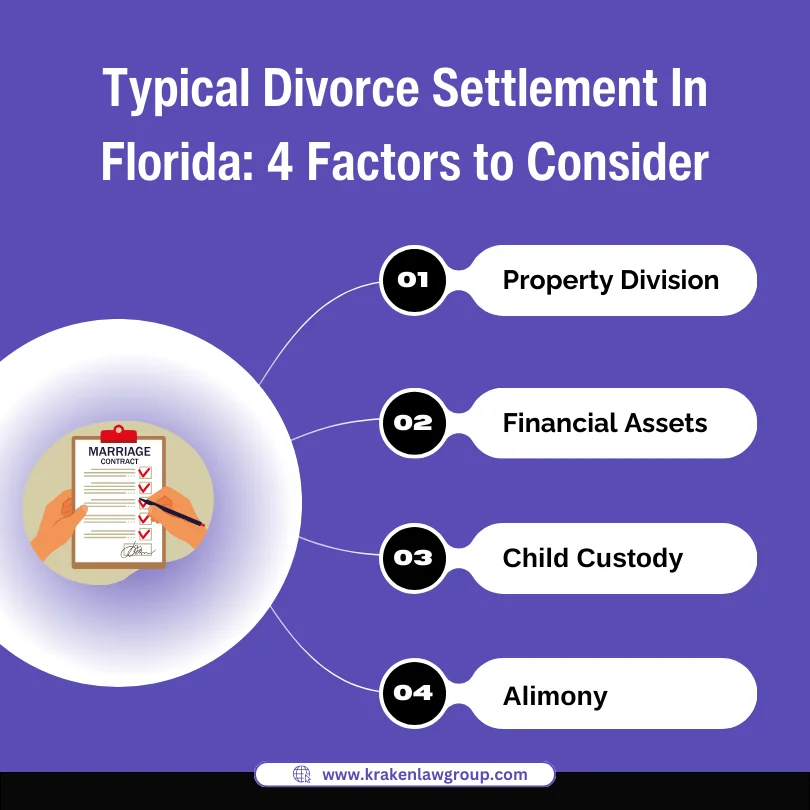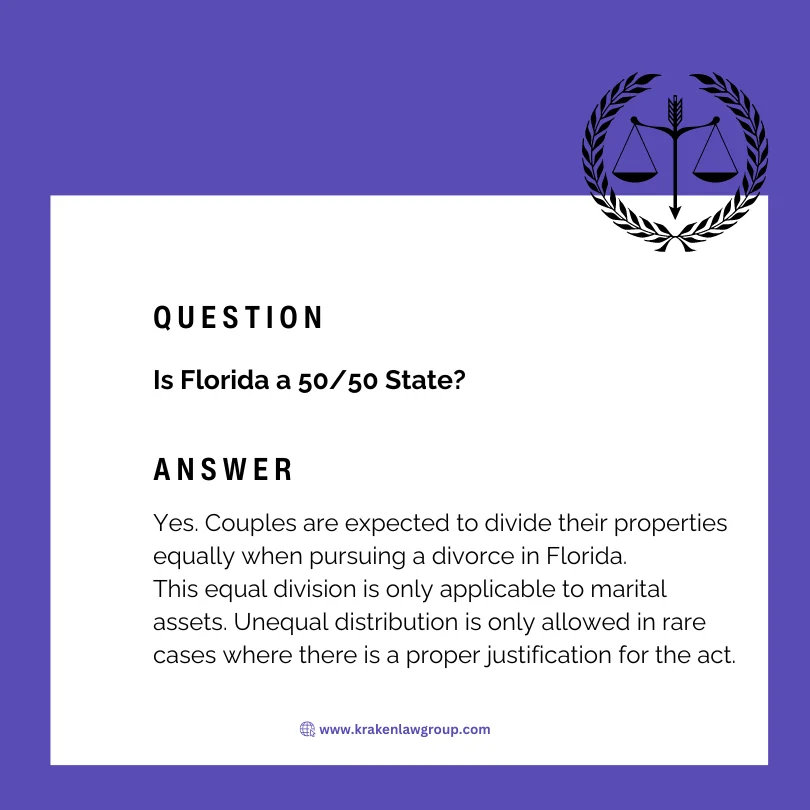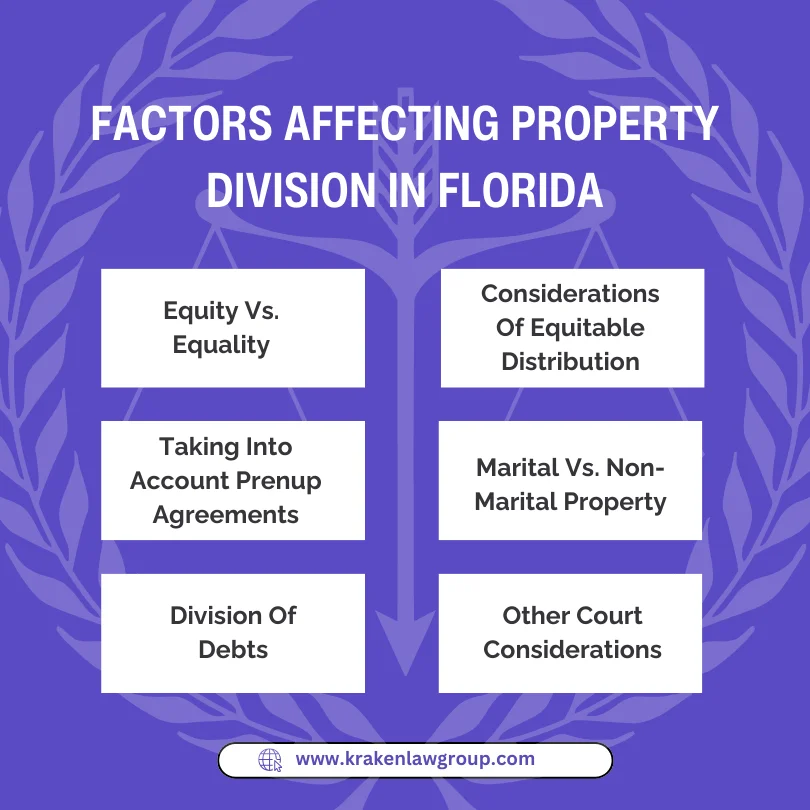Developing a marital settlement agreement in Florida is easy if you and your partner agree on an equal division of assets. However, that is difficult to do for most couples.
You may want a specific property, while your partner may not be ready to give up on that asset. Whatever the case, it can make your divorce proceedings complex.
If you’re hiring a divorce lawyer, you may be wondering about who gets the house in a divorce in Florida. Dive into this post to learn more.
Typical Divorce Settlement In Florida

A typical divorce settlement in Florida considers various factors such as:
- Property division
- Financial assets
- Child custody
- Alimony
Laws about marital property Florida usually divide a couple’s property into two categories. If you and your partner bought a property during the marriage, it comes under the marital asset category.
Meanwhile, properties you had before marriage are called separate assets. For marital assets, the division is supposed to be equal or equitable. If you and your partner cannot decide that, a judge will have to interfere.
An Overview Of The Marital Property Division Under Florida Laws

Many people wonder “Is Florida a 50/50 state?” when it comes to laws around marital property division. The answer is yes. Couples are expected to divide their properties equally when pursuing a divorce in Florida.
This equal division is only applicable to marital assets. Unequal distribution is only allowed in rare cases where there is a proper justification for the act.
Factors that may affect unequal division of your marital property Florida houses are:
- Each partner’s contribution to the marriage
- Income and separate assets of both spouses
- Marriage duration
- The desire of a spouse to get exclusive rights to a specific property such as the family home
- Child custody and support
- Each partner’s contribution towards maintaining and enhancing the marital asset
- A partner’s desire to get the house to raise their minor children
After considering all these factors, a judge may decide who gets the house in a divorce in Florida.
Florida Is An Equitable Divorce State: Understanding Property Division Better

When it comes to who gets the house in a divorce in Florida, you must understand the state is equitable. This means a strict and fair approach is used for property division.
Let’s look at the top factors that affect property distribution in this state and help you understand who gets the house in a divorce in Florida:
1. Equity Vs. Equality
Many people believe equity and equality mean the same when trying to determine who gets the house in a divorce in Florida. However, that is not true.
Equitable property division does not mean that assets will be divided in a 50-50 manner. It only means that the distribution will be balanced and fair, but does not have to be necessarily identical.
A judge will consider various factors such as income status, child custody, and much more to divide properties in a balanced manner. However, one spouse may get more assets than the other in equitable distribution.
The difference in distribution does not mean that it is not fair. For example, a judge may grant your spouse more properties if you have greater separate assets and income levels.
Meanwhile, equal distribution of property means that both spouses will split their assets equally. For example, if there are 14 marital properties, you and your partner will get seven each. The court will decide the distribution according to property values and other factors.
Even properties that have been bought during your marriage, but named under one partner also come under equitable distribution. Remember there is no steadfast rule about who gets the house in a divorce in Florida.
2. Considerations Of Equitable Distribution
Equitable distribution aims to achieve balance and fairness during a divorce in Florida. It may not be equal division, but it is still fair once considering all factors.
Who gets the house in a divorce in Florida is not fixed. If your spouse gets the home to raise your children, you may be paid your share’s value and interest to make the distribution balanced. This is an example of equitable asset division.
You may also be offered another property under your marital assets with a similar value as the home. The division of assets may not be equal, but the financial values of the distributed properties may be 50-50.
The court will understand the lifestyles of both parties when deciding who gets the house in a divorce in Florida. They may also check which partner contributed more towards payments of various properties.
Sometimes the court may also consider the desires of each partner to keep specific properties. Of course, a valid reason must be given to justify the desire.
Once the court considers all these things, they will divide your marital properties accordingly. If you had separate properties before your marriage, you would not have to worry about losing them under this division.
3. Taking Into Account Prenup Agreements
Property division is a common issue that arises whenever a couple is getting a divorce in Florida. Many people prepare for this problem through prenuptial agreements before their marriage.
If such an agreement has been signed, the division of property may be decided already. For example, you may expect to get specific properties under the prenup such as the marital home.
Meanwhile, your spouse may get a summer house as per the agreement. Whatever the case, prenup agreements make it easy to decide who gets the house in a divorce in Florida.
It also allows courts to finalize separation promptly. That is because the judge will not have to consider different factors for property division. A prenuptial agreement can help you decide ownership of marital assets easily.
Of course, you must read the agreement thoroughly before signing. In some cases, one partner may get all the marital properties, while the other spouse may receive a specific amount as per the asset values.
Remember changing the property division after signing a prenup is difficult. Getting around its clauses will be almost impossible unless you have an expert lawyer by your side.
4. Marital Property In Florida Vs. Non-Marital Property
Another important factor that affects who gets the house in a divorce in Florida is the classification of assets. Properties are mainly divided into two categories:
- Marital assets are those properties that are acquired after the marriage but before the divorce filing
- Non-marital properties are those that have been under your name before the marriage
Marital assets include debts, properties, and other economic or non-economical assets. Even if the property is in the name of only one spouse, it comes under marital assets. So it will be distributed accordingly by a judge.
All non-marital assets are not acquired before marriage. You may receive some things as gifts during your marriage. These will come under separate properties, so they may not be included in equitable distribution.
This is why it is important to organize your assets into marital and non-marital categories before divorce filing. If you provide incorrect information to the court, you may risk losing your exempt properties.
Properties that are inherited after your marriage also come under non-marital assets. Determining the division of assets can be complex due to these categories. For example, your non-marital property may experience a value increase during your marriage.
If so, then the value increase may come under marital asset distribution. Hiring a lawyer for this step is the best idea to ensure favorable division.
5. Division Of Debts
Division of debts also comes under property division in Florida. So you must not think that this term is only for deciding who gets the house in a divorce in Florida.
Marital property Florida includes debts that you and your partner may have gotten during the marriage. For example, if you both owe a bank $10,000 credit card debt, its liability will be considered during your legal divorce.
Your properties will be divided accordingly to help you pay your debts and enjoy fair asset distribution. Marital debts are also divided equally to avoid significant financial burdens on one spouse.
Of course, the conditions may vary in specific divorce cases. That is why contacting a lawyer for this purpose is essential. You may consult them to understand Florida divorce laws property division category has.
Always consider debts when requesting property division in Florida. This will allow you to determine which assets you can keep after paying off the debt.
Sometimes a debt may be so high that you may have to sell all the receiving properties. If you and your partner don’t have any debts, it will make it easier to divide your marital assets.
6. Courts Consider Various Things Before Deciding Who Gets The House In A Divorce In Florida
Family courts consider a lot of things before deciding who gets the house in a divorce in Florida. These include:
Minor Children
The number of minor children and their custody affects who gets the house in a divorce in Florida significantly. If you have complete custody of the children, you may require the marital home to raise them.
There may be financial obstacles preventing you from getting a new property after the divorce. The court will consider these things to decide whether you must get the house or not.
They may also decide to sell the property and equally divide its amount between you and your partner. The given amount may be high enough to help you rent or purchase a new home.
Economic Differences
Economic differences also affect who gets the house in a divorce in Florida. This is especially true if one of the spouses had sacrificed their career due to the marriage.
Your spouse may have a high-level degree that allows them to work a senior-level job with high pay. Meanwhile, you may only have a college degree because your spouse may not have allowed you to study further after marriage.
Whatever the case, the judge will consider the net income of both spouses and their maximum employment potential. This is done to ensure no partner is put in financial hardships after the divorce due to unfair division.
Wasteful Dissipation
Wasteful dissipation is a common act that many spouses engage in before a divorce. It refers to spending marital assets excessively or selling properties knowing a divorce is impending.
You may decide to sell marital properties solely in your name discretely to receive the total amount before the divorce. If such properties are divided during separation, you cannot receive the complete value.
This is why spouses engage in this unlawful activity to maximize their finances while leaving the other party in hardships. If you do this, the judge may distribute your remaining properties unequally.
It may also cause you to pay the share of the earlier assets to your spouse. So it is better to avoid engaging in wasteful dissipation before your divorce in Florida.
Marriage Contributions
Spousal contributions to mortgage payments, maintenance, and renovations during marriage can also make a property marital even if one spouse owned it separately first.
A spouse’s efforts towards homemaking and childcare also come towards marriage contributions. So your efforts don’t need to always be financial.
If you put your career on hold due to the marriage, the judge will consider it. The court will understand all these things before deciding who gets the house in a divorce in Florida.
FAQs
Who Has To Leave The House In A Divorce In Florida?
A court will decide who has to leave the house in a divorce in Florida. Sometimes the property may be sold by the court, so both parties will have to leave it. In such cases, the spouses will receive their financial shares instead of the home.
Who Gets The House In A Divorce With Children?
You may receive the house if you have your children’s custody and show a desire to retain this property. The court will consider factors such as your spouse’s net income and contributions towards the marriage. If your contributions are greater but your net income is lower, the court may grant you the home.
How Is A House Divided In A Divorce In Florida?
A house is divided through equitable or equal distribution in Florida. In the former case, the property may be given to one spouse, while the other partner may receive a financial share.
For equal distribution, the house may be sold off. Its total amount can then be equally divided between the two spouses.
What Is A Wife Entitled To A Divorce In Florida
A wife is entitled to equitable or equal distribution of marital assets during a divorce in Florida. These may include financial debts, family homes, and vehicles purchased during marriage.
Hire A Family Lawyer In Florida To Understand Property Division Better
Who gets the house in a divorce in Florida will depend on the judge reviewing the case and other factors. Handling legal proceedings alone can be difficult and overwhelming.
So hire a lawyer now by contacting us to make your property division process easier during a divorce in Florida.


